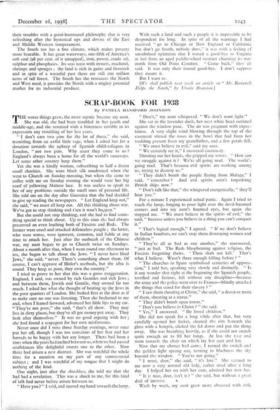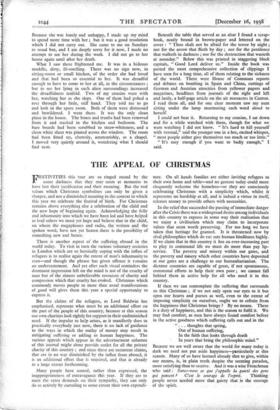SCRAP-BOOK FOR 1938
By PAMELA HANSFORD JOHNSON
THE worse things grew, the more mystic became my aunt. She was old, she had been troubled in her youth and middle-age, and she resented with a bitterness terrible in its expression any troubling of her last years.
"I don't care two pins for the lot of them," she said, trembling from an awful little rage, when I asked her for a donation towards the upkeep of Spanish child-refugees in London, "not two pins. Why must they come to us ? England's always been a home for all the world's runaways. Let some other country keep them."
Yet she was a kindly woman, subscribing to half a dozen small charities. She wore black silk unadorned when she went to Church on Sunday morning, but when she came to coffee with me on Sunday evening she would wear her big scarf of yellowing Maltese lace. It was useless to speak to her of any problems outside the small ones of personal life. She told me on the day after Guernica that she had decided to give up reading the newspapers. "Let England keep out," she said, " we must all keep out. All this thinking about war. We've got to stop thinking and lien it won't happen."
But she could not stop thinking, and she had to find some- thing special to think about. Up to this time she had always preserved an even loathing both of Fascists and Reds. The former were cruel and attacked defenceless people ; the latter, who were worse, were ignorant, common, and liable at any time to attack her. Just after the outbreak of the Chinese war, my aunt began to go to Church twice on Sundays. About a month after that, when I went round one afternoon to tea, she began to talk about the Jews. "I never have liked Jews," she said, "never. There's something about them. Of course, I can't approve of Hitler's methods, but the idea is sound. They keep us poor, they own the country."
I tried to prove to her that this was a gross exaggeration. England, I said, was owned by rich Gentiles and rich Jews ; and between them, Jewish and Gentile, they owned far too much. I asked her what she thought of beating up the Jews in the poor quarters of London. She looked first at the door as if to make sure no one was listening. Then she beckoned to me and, when I leaned forward, advanced her little lips to my ear. "They're not poor," she said, "that's all show. They may live in dirty places, but they've all got money put away. They look after themselves." It was no good arguing with her ; she had found a scapegoat for her own misfortunes.
Never once did I miss those Sunday evenings, never once put her off, though I was too conscious of her fear and her hatreds to be happy with her any longer. There had been a time when the years had melted between us, when we had passed confidences like delightful sweets one to the other. Now there had arisen a new distrust. She was watchful the whole time for a mention on my part of any controversial subject ; and I was watchful of my tongue that I might do nothing of the kind.
One night, just after the Anschluss, she told me that she had had a revelation. This was a shock to me, for this kind of talk had never before arisen between us.
"Have you?" I said, and moved my hand towards the lamp. "Don't," my aunt whispered. "We don't want light."
She sat in the lavender dusk, her nect white head outlined against the window pane. The air was pregnant with expec- tation. A very slight wind blowing through the top of the casement stirred the roses in the bowl that had been her wedding present from my grandfather, and a few petals fell. "We must believe in evil," said my aunt.
"We certainly see it," I answered cautiously.
Shooting out her hands, she gripped my wrists. "How can we struggle against it ? We're all going mad. The world's going mad. That's because evil spirits are working among us, trying to destroy us."
"They didn't bomb the people fleeing from Malaga," I said, " remember ? And evil spirits aren't torpedoing British ships now."
"Don't talk like that," she whispered energetically," they'll hear you."
For a minute I experienced actual panic. Again I tried to reach the lamp, longing to pour light over the devil-haunted corners and into my aunt's haunted eyes, but again she stopped me. "We must believe in the spirits of evil," she said," because unless you believe in a thing you can't conquer it."
"That's logical enough," I agreed. "If we don't believe in Italian bombers, we can't stop them destroying women and children."
"They're all as bad as one another," she murmured, "just as bad. The Reds blaspheming against religion, the Fascists forgetting theirs. Thou shalt not kill.' That's what I believe. Wasn't there enough killing before ? "
"The churches in Spain symbolised centuries of oppres- sion," I told her, speaking very slowly and distinctly. " Is it any wonder that right at the beginning the Spanish people, terrified and furious, left without any discipline—because the army and the police went over to Franco—blindly attacked the things that stood for their slavery ? "
"I saw them shooting at Christ," she said," a dozen or more of them, shooting at a statue."
"They didn't bomb open towns."
"Don't you believe in Christ ? " she said.
"Yes," I answered. " He loved children."
She did not speak for a long while after that, but very carefully opened her locket, cleaned the rim beneath the glass with a hairpin, clicked the lid down and put the thing away. She was breathing heavily, as if she could not snatch quite enough air to fill her lungs. At last she rase and went towards the chair on which lay her coat and hat.
Now that my chance bad Come, I turned the switch and the golden light sprang out, turning to blackness the sky beyond the window. "You're not going."
" I must, dear," she said, "it's late." She seemed to me now a very normal old lady, rather tired after a long day. I helped her on with her coat, admired her new hat.
" It is nice, dear, isn't it ? " she said, but without a great deal of interest.
Week by week, my aunt grew more obsessed with evil. Because she was lonely and unhappy, I made up my mind to spend more time with her ; but it was a good resolution which I did not carry out. She came to me on Sundays as usual but, and I am deeply sorry for it now, I made no attempt to see her during the week. I did not go to her house again until after her death.
What I saw there frightened me. It was in a hideous muddle, dirty, ill-smelling. There was no sign now, in sitting-room or small kitchen, of the order she had loved and that had been so essential to her. It was dreadful enough to have to come to her at all, in the circumstances ; but to see her lying in such alien surroundings increased the dreadfulness tenfold. Two of my cousins were with her, watching her as she slept. One of them had poked a rose through her little, stiff hand. They told me to go and look in the spare room. Both of them were distressed and bewildered. I went there. It was the only clean place in the house. The boxes and trunks had been removed from it and stacked in the kitchen and bedroom. The bare boards had been scrubbed to straw-whiteness, and a clean white sheet was pinned across the window. The room had been fitted up, clumsily, amateurishly, as a chapel. I moved very quietly around it, wondering what I should find next. Beneath the table that served as an altar I found a scrap- book, neatly bound in brown-paper and lettered on the cover : "Thou shalt not be afraid for the terror by night ; nor for the arrow that flieth by day ; nor for the pestilence that walketh in darkness ; nor for the destruction that wasteth at noonday." Below this was printed in staggering block capitals, "Good Lord deliver us." Inside the book was pasted the most comprehensive collection of clippings I have seen for a long time, all of them relating to the sickness of the world. There were House of Commons reports and debates on bombing in Spain and China, cuttings of German and Austrian atrocities from yellower papers and magazines, headlines from journals of the right and left and lastly, a half-page article on the air massacres in Canton. I read them all, and for one clear moment saw my aunt sitting under the lamp murmuring each word aloud to herself.
I could not bear it. Returning to my cousins, I sat down and for a while watched with them, though for what we were watching I did not know. "It's hard to kill yourself with veronal," said the younger one in a hot, excited whisper, "most people either give themselves too much or too little."
"It's easy enough if you want to badly enough," I said.















































 Previous page
Previous page